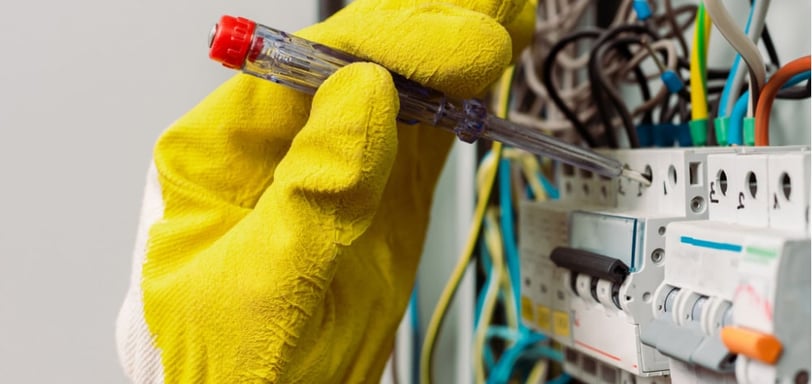Metrics that Matter - Electrical


Metrics That Matter: What Electrical Business Owners Need to Know Before Selling
Selling an electrical contracting business isn’t just about proving you’re busy, it’s about showing potential buyers that your business is profitable, sustainable, fully compliant, and able to run without you.
Buyers today are more sophisticated than ever. They rely on concrete data and operational strength, not just verbal promises, to decide whether they’re willing to buy your business and how much they’ll pay for it.
If you're a Florida-based electrical business owner, understanding these key metrics and addressing state-specific licensing and compliance issues can make the difference between a fast, profitable sale and a drawn-out process that fails to close.
In this guide, we’ll break down the metrics that matter most, common mistakes to avoid, and how to put your business in the best position to sell.
Why Metrics Matter When Selling an Electrical Business
Buyers are looking for more than a busy schedule, they want a business that has:
Stable and diverse revenue streams.
Strong profit margins.
Qualified, licensed technicians.
Solid operational systems.
Full compliance with Florida’s strict licensing laws.
Failing to showcase these areas could lead to lower offers or failed deals. Focusing on the right metrics ahead of listing helps maximize your business’s value and increases buyer confidence.
Florida’s Electrical Industry Landscape & Who's Buying
Why Florida Electrical Businesses Are in Demand
Florida’s rapidly growing population, constant commercial development, and increasing demand for electrical upgrades (including solar installations and EV chargers) create a booming market for established electrical contractors.
Types of Buyers in the Market
Private equity-backed companies expanding home services platforms.
Strategic buyers (regional competitors seeking expansion).
Owner-operators (licensed electricians looking to buy rather than start from scratch).
Top Buyer Concerns:
Licensing and insurance compliance - essential for operating legally in Florida.
Strong, predictable cash flow.
Skilled and stable workforce.
Good reputation and local presence.
Top Metrics Buyers Analyze
1. Revenue and Service Mix
What It Is: Breakdown of total revenue by type of work:
Residential vs. commercial.
New construction vs. repairs and maintenance.
Emergency calls vs. scheduled work.
Why It Matters: Buyers want to see a balanced mix, not overreliance on one market segment.
What Good Looks Like:
Healthy mix of commercial and residential work.
Recurring service contracts (e.g., for property managers or businesses).
Steady or growing revenue over 3-5 years.
Red Flags:
Overdependence on new construction (vulnerable to economic swings).
Revenue that fluctuates wildly year to year.
2. Gross Profit Margins
What It Is: Revenue minus direct costs (materials, subcontractor labor).
Why It Matters: Margins show how efficiently and profitably your business runs.
What Good Looks Like:
30-35% gross margins, depending on service type (as per Vertical IQ).
Stable year-over-year margins, showing consistent job costing and pricing.
Red Flags:
Declining margins due to underpricing or cost overruns.
3. Customer Concentration
What It Is: The percentage of total revenue coming from top clients.
Why It Matters: Buyers want diverse client bases to avoid risk if one customer leaves.
What Good Looks Like:
No single client exceeding 10-15% of total revenue.
Mix of residential customers, property managers, builders.
Red Flags:
One or two clients making up most of your income; buyers see this as a risk to future earnings.
4. Recurring Service Contracts
What It Is: Long-term agreements to provide ongoing electrical maintenance and service.
Why It Matters: Predictable, recurring revenue that makes buyers feel more secure.
What Good Looks Like:
Maintenance contracts with commercial clients or HOAs.
Service agreements for long-term clients.
Red Flags:
No recurring contracts, only one-off jobs.
5. Licensing & Compliance (Florida-Specific)
What It Is: Florida's Certified Electrical Contractor license (EC license) and proper insurance.
Why It Matters: Non-negotiable for Florida buyers - unlicensed work is illegal.
What Good Looks Like:
Active EC license.
All work permitted and compliant with local codes.
General liability and workers’ compensation insurance in place (both required in Florida).
Red Flags:
Expired licenses.
Non-compliant work.
Uninsured workers or subcontractors.
6. Workforce & Technicians
What It Is: Quality and stability of electricians and apprentices.
Why It Matters: Buyers want a team they can count on - not a company that relies on the owner for everything.
What Good Looks Like:
Loyal, licensed, and experienced technicians.
Low turnover.
Red Flags:
High turnover or lack of qualified staff.
Dependence on subcontractors without formal agreements.
Operational Elements That Impact Value
Standard Operating Procedures (SOPs) for estimating, scheduling, safety, and quality control.
Technology adoption (ServiceTitan, Jobber, Housecall Pro) for job management and client communication.
Well-organized financial records (clear income/expense separation, CPA-reviewed books).
Fleet and equipment in good condition.
Proper insurance coverage to meet state licensing requirements.
Positive online reputation (Google reviews, BBB rating).
Common Mistakes Sellers Make in the Electrical Industry
Operating without valid licenses or insurance - a deal breaker for Florida buyers.
Mixing personal and business expenses - makes financial performance unclear.
Relying on one big client - revenue risk.
No documented processes - makes handover challenging.
Poor workforce retention - buyers fear difficulty replacing key staff.
Neglecting reputation management - bad reviews drag down value.
Actionable Tips to Improve Key Metrics Before Listing
Diversify revenue streams - add commercial clients, recurring contracts, residential maintenance.
Boost gross margins - review pricing, negotiate better supplier deals, improve job costing.
Secure long-term contracts - maintenance agreements for stable cash flow.
Check licensing and insurance - ensure active EC license, fully insured workforce.
Build and retain a strong team - offer training and certifications, retain top electricians.
Implement technology - streamline job management and customer communication.
Clean up financials - work with a CPA to prepare clean, accurate records.
Invest in reputation - actively collect positive reviews and resolve negative feedback.
Conclusion: Preparing Your Florida Electrical Business for Sale
Selling an electrical contracting business in Florida can be a highly profitable exit but only if you focus on the metrics buyers care about. By ensuring compliance, building a stable team, diversifying revenue, and maintaining clean records, you’ll dramatically improve your business's value and appeal to serious buyers.
Don't wait until you're ready to sell to start thinking about these metrics, begin now, and you’ll be in a much stronger position when the time comes.
Thinking about selling your Florida electrical business?
Contact us for a confidential conversation and learn how to position your business for maximum value.
